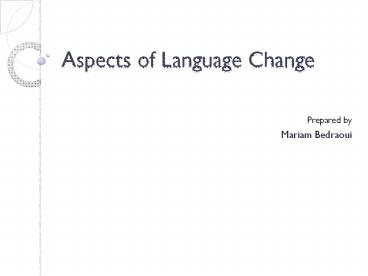Aspects of Language Change - PowerPoint PPT Presentation
Title:
Aspects of Language Change
Description:
Aspects of Language Change Prepared by Mariam Bedraoui Outline Lexical Change Borrowing Coining new words Semantic Change Broadening Narrowing Shifts of meaning Sound ... – PowerPoint PPT presentation
Number of Views:122
Avg rating:3.0/5.0
Title: Aspects of Language Change
1
Aspects of Language Change
- Prepared by
- Mariam Bedraoui
2
Outline
- Lexical Change
- Borrowing
- Coining new words
- Semantic Change
- Broadening
- Narrowing
- Shifts of meaning
- Sound change
- Loss of phonemes
- Addition of phonemes
- Metathesis
- Syntactic Change
- Word order
- Re-analysis
- Grammaticalization
3
Aspects of language Change
4
Lexical Change Borrowing
- Languages are avid borrowers
- Two-fifths of common words in English are loan
words - Direct/indirect borrowing
- Phonological and morphological treatment of loans
- Rarely borrowed words
5
Borrowing Examples
- Kayak
- Raccoon
6
Borrowing Further Examples
Examples of Loan Words Examples of Loan Words
kayak superstar
Yogurt Top model
Racoon T- shirt
Ski Check- up
kangaroo Gentlemen
Tsunami look
democracy cool
coach computer
yacht disk
algebra fan
7
Lexical Change Coining New Words
- New words can be formed using the basic
resources of the language through a number of
processes - Compounding Combining two or more words to form
new words - Blackboard- girlfriend- gingerbread
- shopkeeper- sky diving
- laptop- ozone friendly
- Derivation Using affixes to create new words
- warmth- length- depth- wisdom- freedom-
stardom - Otherwise- clockwise- moneywise- profitwise
- miniskirt- mini-budgets- mini-project-
mini-wars
8
Lexical Change Coining New Words
- Clipping Forming a word by extracting an
arbitrary portion of a word of an identical
meaning - phone (telephone)
- bus
- Gym (gymnasium)
- Flu (influenza)
- Ciggie (cigarette)
- Blending Pieces of existing words are combined
to form new words - Motel
- Smog
- Brunch
- Chunnel
- Oxbridge
- Acronyms The reduction of long phrases to a few
letters - NATO- FBI- BBC
- TA- LA
- Laser
9
Semantic Change Broadening and Narrowing
- Broadening Words acquire more meanings beside
the original one - Dog
- Holiday
- Picture
- Mouse
- Virus
- Narrowing limiting the semantic scope that words
used to have - Meat
- Deer
- Girl
10
Semantic Change
11
Semantic Change Shift of Meaning
- Shift of Meaning Words cease to mean what they
used to, and take on new semantic representations - Silly
- Nice
- Immoral
- With
- cheer
12
Sound Change
- Phonetic and phonological
- Natural
- Ease of articulation
13
Sound Change Types
- Loss of phonemes
- Knot- knee- knife-know
- Make- time- dive
- Lit- gros- murs- aimer- part
- Wednesday- Choclate- camera- correct- police
- Addition of phonemes
- Latin scala- snob- smeralda- spatha
- Spanish escala- esnob-esmerada- espada
- Middle English amonges- amiddes, betwix
- Amongst- amidst- betwixt
14
Sound Change Types
- Metathesis It occurs when two sounds switch
places - Old English Ask- aks
- Latin crepare- parabola- miraculu- pericula
- Spanish quebrar- palabra- milagro- peligru
15
Syntactic Change Types
- It occurs in the grammatical notions that govern
languages - Slow and in need for further investigation
- Word order
- Old English SOV and SVO language
- Modern English An SVO language
- Reanalysis a process whereby grammatical
notions which has one particular function comes
to be perceived by the speakers of a language as
having a second. - The perfect tense in English
- I have finished my dinner
- I have a copy of her new book
- She have my hair cut
- She has her daughter trapped in war
- Old English Your faith has you healed
- Your faith healed you
16
Syntactic Change Types
- Grammaticalization The process whereby lexical
items are reduced to grammatical items without
entirely losing their function as words. - Verbs meaning go, come, want very often
develop into grammatical markers of futurity - Going to
- Will
17
- Thanks for your attention































